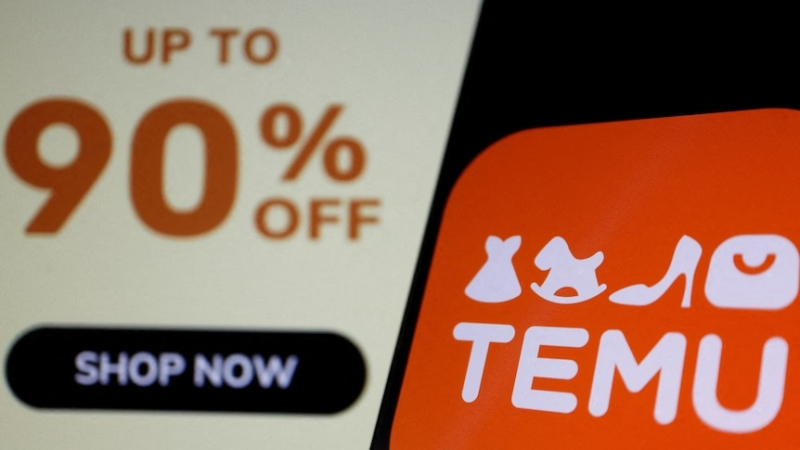Ecommerce platform Temu launched in the US in 2022 and is a major rival to Shein. (AP: Florence Lo)
It was always a matter of when, not if, Donald Trump would introduce a fresh set of tariffs on his return to the White House.
Within a fortnight of taking office for his second term, the US president cracked down on a measure that puts him at odds with his Reagan-inspired campaign battle cry: "Are you better off than you were four years ago?"
While his tariffs on Canada and Mexico have been given a 30-day reprieve, China hasn't been so lucky, with all Chinese products imported to the US now attracting a new 10 per cent tariff.
At the same time, the US has cracked down on a little-known tax loophole that allows millions of parcels into the country every week from cheap e-commerce retailers, including Shein and Temu.
A cost-of-living crisis turbocharged both companies' presence in the US, and Mr Trump's first presidency ironically helped them gain a strong foothold in the country.
But now, the double-whammy of new tariffs and the suspension of a tax loophole will see everyday Americans pay an even higher price.
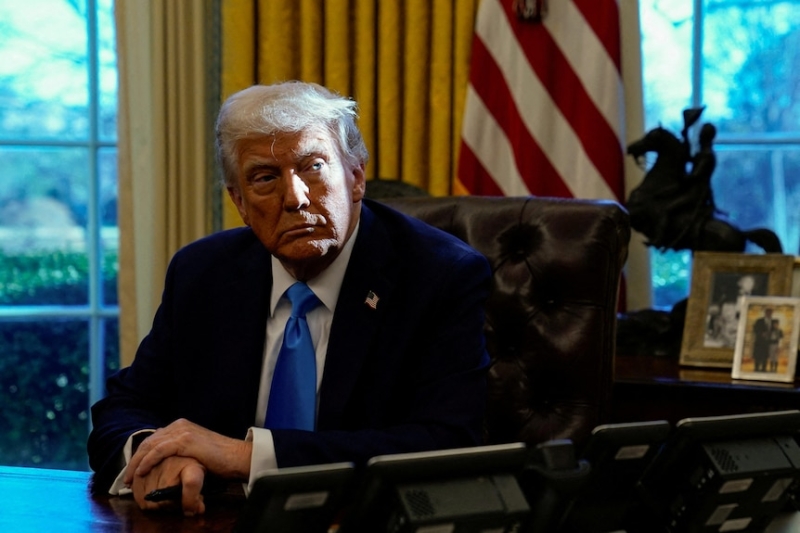
US President Donald Trump's latest tariffs on China came into effect on Tuesday. (Reuters: Elizabeth Frantz)
One loophole, millions of parcels
Since 2015, Americans have been able to buy items from overseas without getting hit with an import tax — so long as the value of the parcel is under $US800 ($1,275).
It operates the same as a duty-free allowance, but it has a more complex-sounding name: the de minimis exemption.
The loophole had been publicly questioned long before Mr Trump's inauguration, with the Biden administration announcing last September that it was looking to take action against the volume of de minimis shipments arriving in the country.
At the time, the Biden administration said the actions were about addressing the "significant increased abuse of the de minimis exemption", with a focus on Chinese-founded e-commerce platforms, such as Shein and Temu.
Data released by the US Customs and Border Protection Agency last November illustrated how big of a problem de minimis shipments had become in the country.
In 2024, the agency estimated it processed more than 4 million de minimis shipments into the US on a daily basis — more than double the volume it had processed in 2021 — with Shein and Temu accounting for more than 30 per cent of the total packages.
Will Temu and Shein change the way we shop online forever?
Photo shows An orange logo with the word TEMU is seen on the screen of a phone held up by a hand in front of ads on a computer
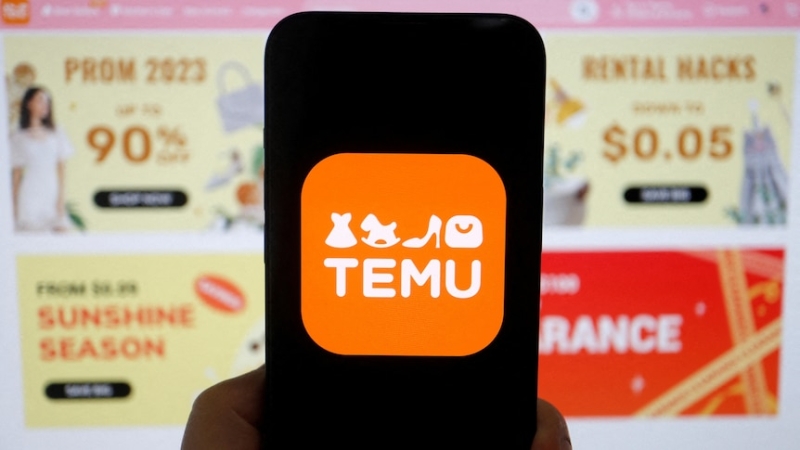
The sheer volume of parcels arriving in the US has made it impossible for customs officials to examine the shipments and "intercept unsafe and illegal goods".
But Mr Trump's first presidency laid the groundwork for the ballooning to take place, after imposing a series of tariffs on Chinese goods in 2018.
China responded by waiving the export tax Chinese-based companies had to pay its government when sending their goods overseas.
In effect, Chinese companies were no longer paying taxes of 13 per cent for every parcel they sent abroad.
Coupled with the de minimis exemption, it meant Chinese businesses were better off when shipping products to the US — and cheap online retailers such as Shein and Temu were well-positioned to strike during the COVID-19 pandemic and cost-of-living crisis that followed.
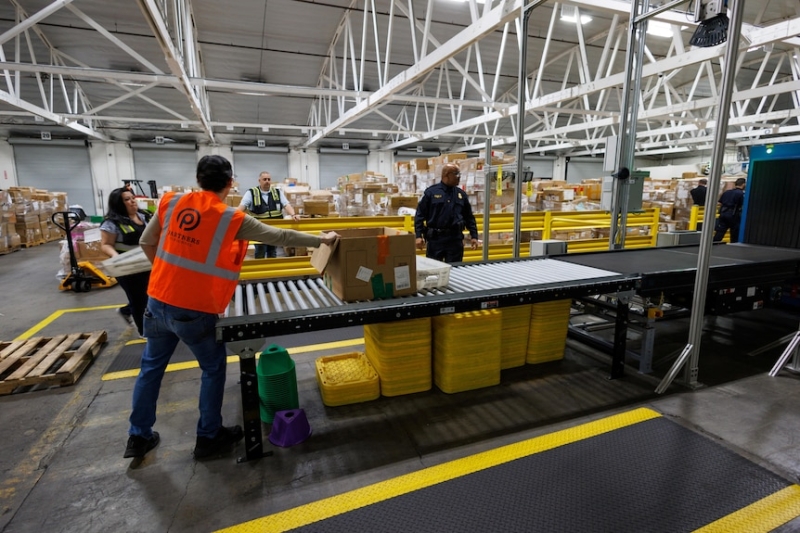
US customs workers are physically unable to examine the millions of packages that arrive daily. (Reuters: Mike Blake)
Trump tariffs, take two
Even before returning to the White House, Mr Trump had said tariffs on China were about stemming the flow of illicit substances into the US — in particular, the synthetic opioid fentanyl.
US customs officials have also commented that the volume of de minimis packages has made it "almost impossible" for them to detect illicit substances.
How Australia will be caught up in Trump's trade war
Photo shows Donald Trump sits at a desk holding a black folder open with yellow-gold curtains and two flags behind him.
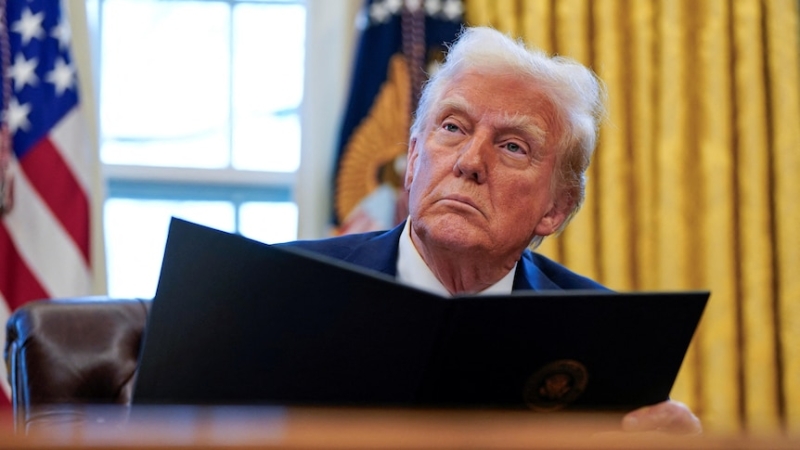
While targeting the de minimis loophole was not explicitly on Mr Trump's agenda during his presidential campaign or after his election victory, analysts say it was a natural progression of his broader agenda.
"There has been some evidence that suggests that people are using that loophole to be able to import the ingredients of fentanyl into the US, so that's certainly one reason," said Harry Murphy Cruise, the head of China and Australia economics at Moody's Analytics.
"The second is what it means for US retailers. They're often buying from the same factories that Temu is selling from, but they're buying in bulk.
"When it comes to the US, they're paying those [import] tariffs on it, and so they're less competitive."
Mr Trump's Secretary of State, Marco Rubio, is also a long-time critic of China and its alleged use of forced labour.
As a senator, Mr Rubio was a lead sponsor for the Uyghur Forced Labor Prevention Act, which bans imports to the US from China's Xinjiang region over claims that the minority ethnic group is subjected to human rights abuses. (China has repeatedly denied the allegations.)
Mr Rubio has previously criticised Shein and Temu over their alleged use of slave labour in their supply chains.
A day after the new tariffs took effect, Semafor reported that the Trump administration was considering adding Shein and Temu to the US Department of Homeland Security's forced labour list.
If that were to occur, it would prohibit goods from the Xinjiang region sold by Shein and Temu from entering the US.
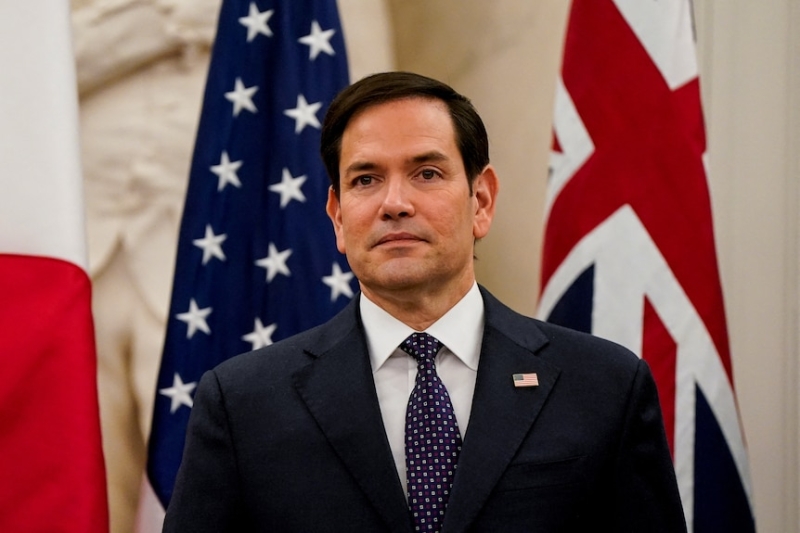
US Secretary of State Marco Rubio is a long-time critic of China. (Reuters: Elizabeth Frantz)
Shein has frequently stated it has zero tolerance for forced labour, and Temu has regularly denied it has links to the practice.
"I think [Mr Trump's] motivations for doing so [suspending de minimis] are probably more around the fentanyl and domestic competition argument, but I certainly think there are many questions still around that forced labour, and Rubio has made that a point to call out," Mr Murphy Cruise said.
Mr Murphy Cruise noted that Mr Trump's decision to impose a universal 10 per cent tariff on all Chinese imports to the US would be in addition to past tariffs levied against the country.
"This brings the overall effective tariff rate up to around 20 per cent," he said.
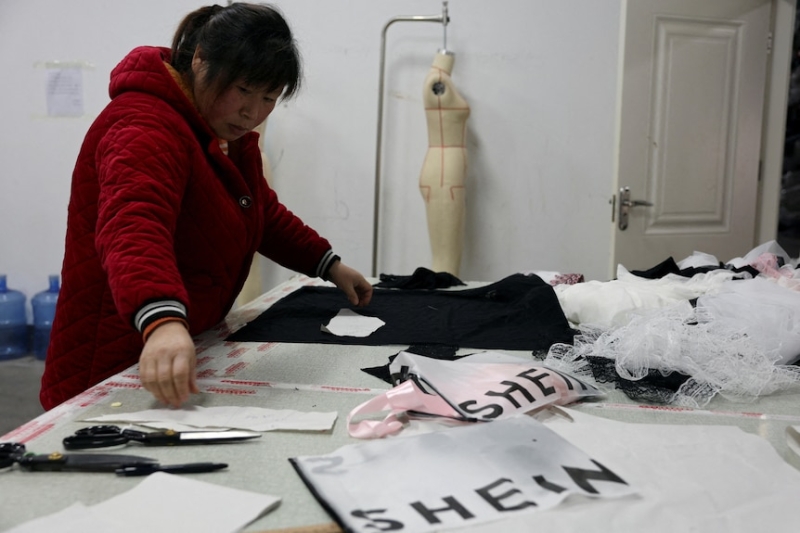
Americans buying clothing from Shein will be paying more when their parcels arrive. (Reuters: Florence Lo)
Disadvantaging the disadvantaged
The new tariffs and the closure of the de minimis loophole will see Americans foot the bill when their orders from sites such as Shein and Temu arrive in the US.
For example, a $US100 order from Temu would attract an import duty of $US20 — and past research indicates that it is lower-income households that would be disproportionately affected, as they have become increasingly reliant on the cheap retailers.
China retaliates with tariffs on US goods after Trump imposes new levies
Photo shows close up of china president xi jinping and US president donald trump
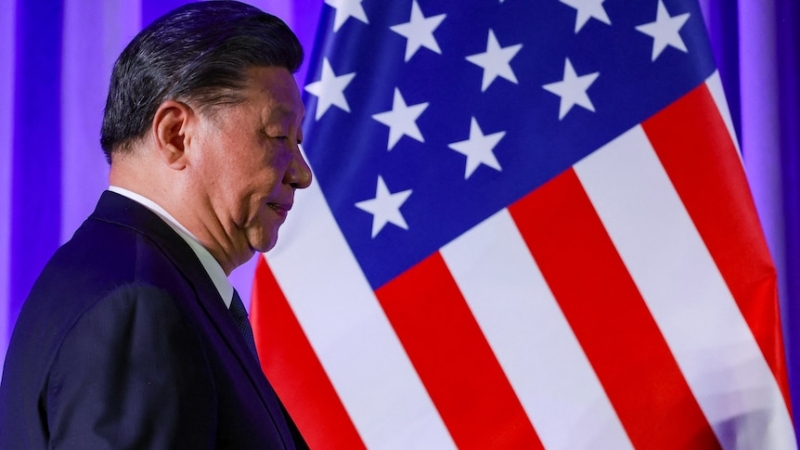
International shipment data, analysed by economists Pablo Faigelbaum and Amit Khandemwal, signalled a correlation between de minimis packages arriving in the US from China and household incomes.
Their findings, published last October, concluded that eliminating the de minimis threshold would "disproportionately hurt lower-income and minority consumers" and reduce aggregate welfare by up to $US13 billion.
"73 per cent of direct shipments imported by the poorest zip codes are de minimis compared to 52 per cent for the richest zip codes," they wrote.
"The share of de minimis shipments from China also declines with income: 48 per cent for the poorest zip codes compared to 22 per cent for the richest.
"If [the de minimis exemption] were eliminated, the tariff schedule would flip from pro-poor to pro-rich."
The pair also examined transaction data from credit cards, and found low-income households were shopping with Shein and Temu at a higher rate than wealthier households, and their business models leveraged the de minimis exemption.
Shein and Temu have separately rejected suggestions that their businesses depend on de minimis in the past.
When contacted by the ABC, representatives for Temu declined to comment on changes to the de minimis threshold and the impact of the tariffs imposed on China by the US.
Shein did not respond before publication.

Shein and Temu have become go-to shopping destinations for Americans with a lower income. (AP: Richard Drew)
Household pain for minimal gain
The double-whammy of removing the de minimis exemption and an additional 10 per cent tariff also risks worsening inflation in the US, explained Dean Baker, a senior economist from the Center of Economic and Policy Research in Washington DC.
"Obviously, inflation was a major issue in our election. The inflation rate has come down. It's almost back to the Fed's target, but nonetheless, it was an issue. That's indisputable," he said.
"But there's no doubt if you have a lot of tariffs, that raises inflation.
"If you impose high tariffs on much of your imports, that's going to raise prices. That means higher inflation."
Trump's trade war heats up
Photo shows Donald Trump in Oval Office
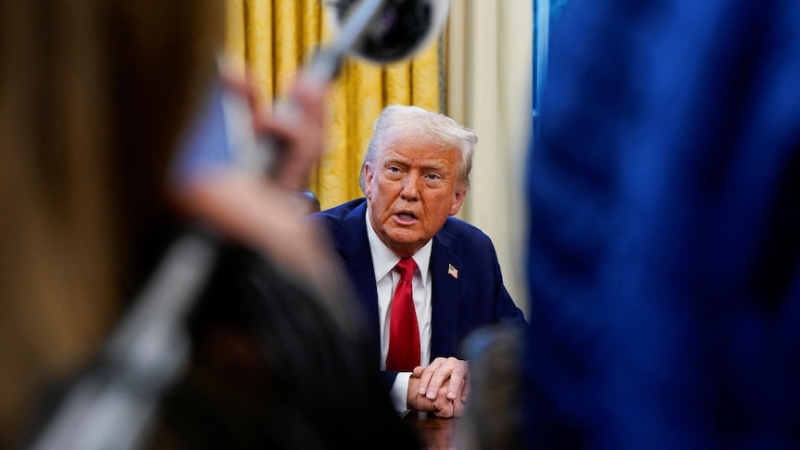
In practice, that will hit lower-income American households the hardest, Mr Murphy Cruise said.
"When inflation rises, it predominantly hurts lower socio-economic groups. They use more of their income, proportionately, on what they need, the essentials," he said.
"So when prices for those types of things go up, the hit to them is far higher than it is to higher income earners.
"This exacerbates that. When they are looking for cheaper purchases overseas, when those purchases now become more expensive, that's another dent for their incomes."
On Tuesday, the United States Postal Service (USPS) announced it would no longer accept parcels arriving from China and Hong Kong, before reversing its decision a day later.
The USPS has not disclosed the reasoning behind the short-lived ban, but reiterated its commitment to helping US Customs and Border Protection with its collection of the import duties to avoid delivery delays.
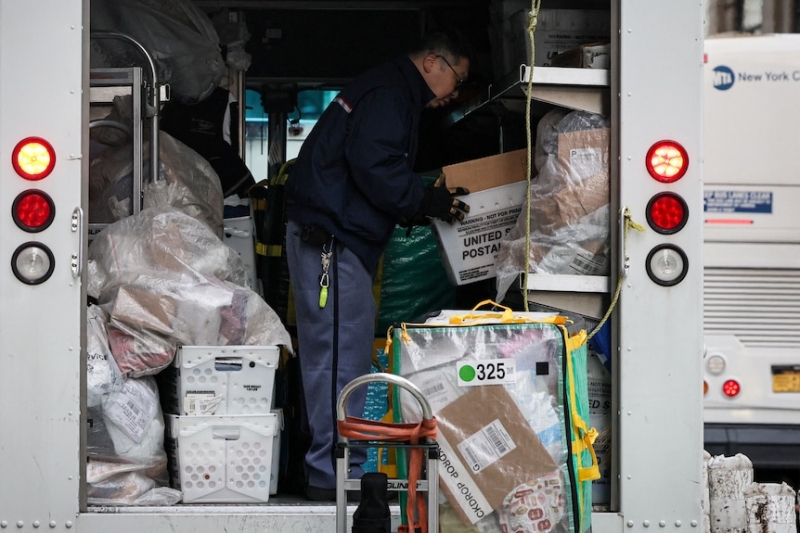
Millions of parcels from China are delivered to American households every day. (Reuters: Brendan McDermid)
For Mr Baker, the objective of Mr Trump's tariffs and his campaign messaging contrasted against their practical implications have created an unusual juxtaposition.
"It's a tax on imports, and it's paid overwhelmingly by people in the United States, and I really don't think most of the people who thought his tariffs were a good idea understood that," he said.
"He was saying we're going to make ourselves rich by having high tariffs. But if you understand what a tariff is, you understand this is a tax on imports.
"I think a lot of the people who voted for him and [were] thinking tariffs were a great idea, they really don't understand what he was saying.
"If he … imposes high tariffs, they'll see it and they're going to pay more.
"I don't think you could tell people they're not paying more when they're paying more. Then I think he will have a problem."
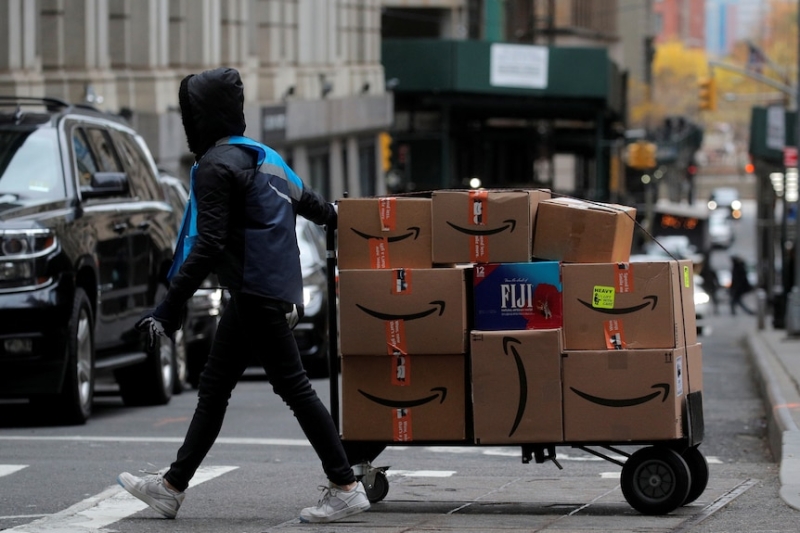
Many of Amazon's products are supplied by third parties based in China. (Reuters: Brendan McDermid)
Is it too much, too late?
There is every chance though that Temu and Shein will avoid the worst of Mr Trump's latest round of tariffs and de minimis changes, at least in the near-term, explained Joe Kaziukenas, the founder of e-commerce intelligence firm Marketplace Pulse.
"I don't think they've Trump-proofed themselves because so many of their goods do come from China … but they have tried to reduce their reliance on de minimis quite aggressively," he said.
"It now, quite often, comes from local warehouses, and that also has an additional benefit of faster delivery speeds.
"It's still Chinese sellers, but that inventory is now in the US, and thus it has paid import duties.
"So when the de minimis threshold is removed, that will have a smaller impact, because not 100 per cent of everything sold on those apps now comes from China directly.
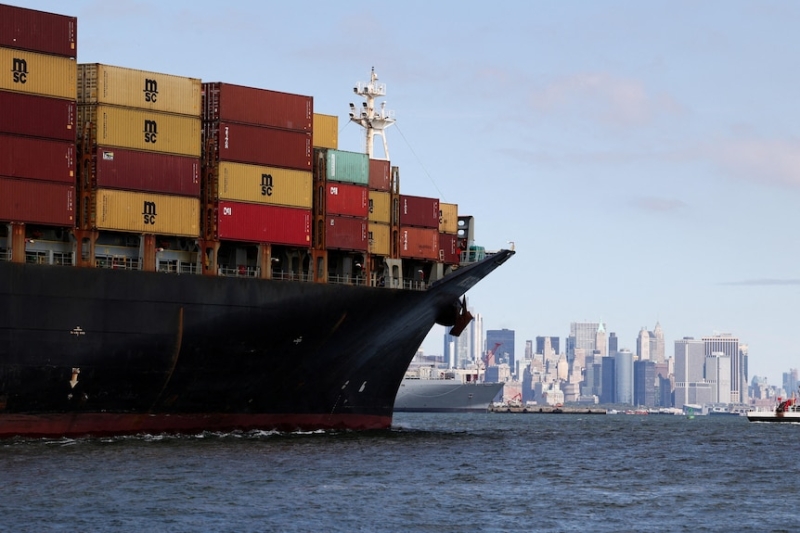
Sites such as Temu shipped large amounts of their inventory to US warehouses before the de minimis loophole closed. (Reuters: Caitlin Ochs)
Another part of Temu's strategy in particular is its shifting away from the ultra-cheap prices it once boasted, tempting customers to "shop like a billionaire".
"One of the Temu people I've talked to have said that to me that they're moving away from cheap to affordable, which is I think a very good way to explain what they're doing," Mr Kaziukenas said.
"They're still cheaper than the alternatives, but they're not five times cheaper than the alternatives."
In the same vein, the actions of the US government cracking down on de minimis may have come too late, he said, with the retailers having made a name for themselves in the minds of US shoppers for years.
"They have benefited from it as much as they can, especially in this period of their growth, and then in the future, they're hoping to rely less on it," Mr Kaziukenas said.
"So by the time the loophole is closed, they're no longer reliant on it 100 per cent."
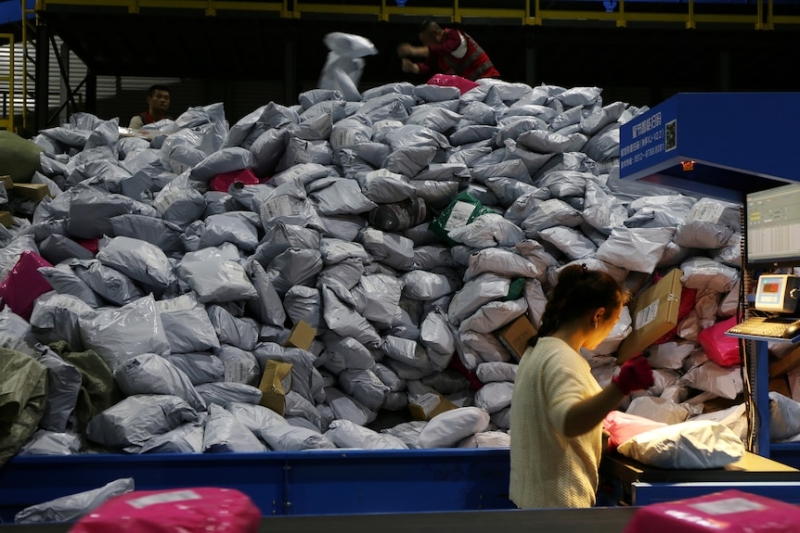
Joe Kaziukenas says it's likely Shein and Temu have been planning for changes to de minimis for years. (Reuters: Stringer )
What does it mean for Amazon?
In theory, Mr Kaziukenas said, Mr Trump's tariff and de minimis decision would also impact Amazon in the US.
"Half of its sellers come from China, and it's almost hidden in plain sight," he said.
"When most people shop on Amazon, they don't really think that they're shopping from a marketplace. They also don't really think that that marketplace is actually just a bunch of sellers in China.
"It's exposed to … tariffs on China just as much as any other retailer, and any increases in tariffs would lead to increases in prices on Amazon.
"That's one of the topics that I'm sure [Amazon founder] Jeff Bezos thinks about a lot, is how do they manage the US and China's relationship? Because any changes to that has a massive impact to prices on Amazon."
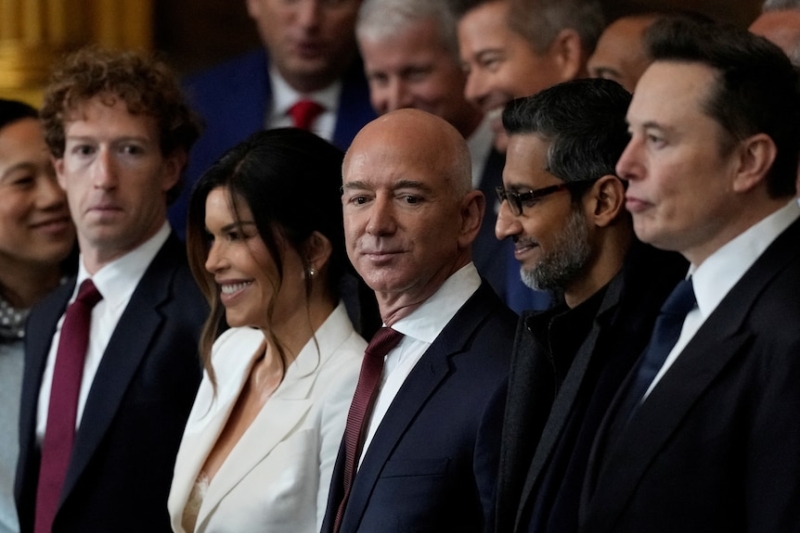
Jeff Bezos (centre) attended Donald Trump's inauguration, alongside Mark Zuckerberg (left) and Elon Musk (right). (Reuters: Julia Demaree Nikhinson)
It's unclear exactly how much of Amazon's business model relies on Chinese-based sellers, but filings to the US Securities and Exchange Commission last year stated that they made a significant contribution to its revenue from third parties, and any regulatory or trade restrictions "could adversely affect our operating results".
There is also the possibility that Amazon may be granted an exemption by Mr Trump to avoid the tariffs altogether, economist Dean Baker says.
"He's already announced that he would exempt Apple with their iPhones from the tariff because the head of Apple made a big contribution to his Inaugural Committee," he said.
"So he may look to the founder of Amazon, Jeff Bezos, who made a big contribution to his Inaugural Committee … and [Mr Trump] may give them special status as well.
"That would further cripple Temu or any Chinese company because they're disadvantaged, so maybe Amazon could bring in their goods from China at half price.
"I don't know what he might do, but the point is he has no qualms about being selective and treating different companies in a different way."
Amazon did not respond to the ABC's request for comment.

